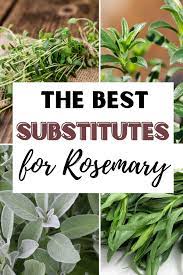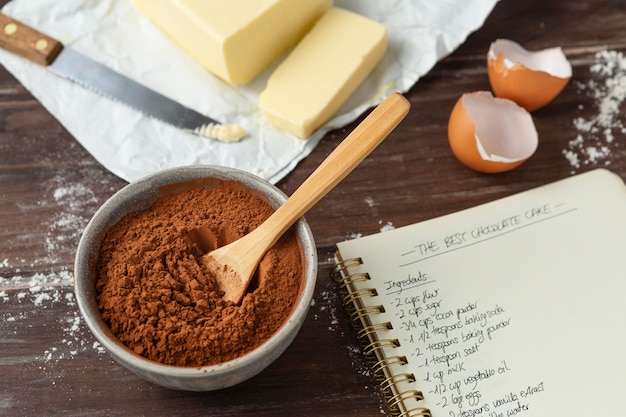Best Alternatives to Rosemary Substitute for Cooking, Healing, and More
When it comes to adding flavor and aroma to your dishes, rosemary is a popular choice. Its distinct piney and citrusy notes can enhance a wide variety of recipes, from roasted meats to soups and sauces. However, there may be times when you run out of rosemary or simply want to try something different. Fortunately, there are several alternatives that can still bring a similar taste and fragrance to your dishes.
One of the best substitutes for rosemary is thyme. Like rosemary, thyme is a versatile herb that packs a punch in terms of flavor. It has a slightly earthy and minty taste that can complement a range of dishes. Thyme works especially well in roasted meats, stews, and marinades. To substitute rosemary with thyme, use the same amount called for in the recipe and adjust to taste.
If you’re looking for a milder alternative to rosemary, marjoram can be a great choice. It has a slightly sweeter and more delicate flavor compared to rosemary, but still adds a pleasant herbal note to your dishes. Marjoram works well in herb blends, soups, and roasted vegetables. Use the same amount of marjoram as you would rosemary in your recipes.
Another option to consider is sage. While its flavor profile is different from rosemary, sage can still bring a unique and aromatic taste to your dishes. It has a slightly peppery and earthy flavor that pairs well with poultry, stuffing, and roasted vegetables. Use sage sparingly, as its flavor can be quite strong. Start with a small amount and adjust to taste.
When you don’t have rosemary on hand, you can also try using oregano as a substitute. Oregano has a similar intensity and pungency as rosemary, making it a suitable replacement in many recipes. It works well in Italian and Mediterranean dishes, such as pasta sauces, pizzas, and grilled meats. Use the same amount of oregano as you would rosemary, and consider adding it towards the end of cooking to preserve its flavor.
While these alternatives can help enhance your recipes when you’re out of rosemary, it’s important to keep in mind that their flavors may not be an exact match. Experiment with different substitutes to find the one that best suits your taste preferences and the specific dish you’re preparing.
Why Find Rosemary Substitutes?
Rosemary is a popular herb that is widely used in cooking for its distinct flavor and aroma. It adds a unique savory taste to a variety of dishes, including roasted meats, grilled vegetables, and even baked goods. However, there are times when you may not have rosemary on hand or prefer to use a different herb for a change of flavor. This is where finding suitable rosemary substitutes becomes essential.
1. Unavailability:
One of the main reasons to find rosemary substitutes is its unavailability. Not everyone has access to fresh rosemary all the time, especially if you live in an area where it is not commonly grown or not in season. In such cases, having a substitute herb on hand can help you achieve a similar flavor profile in your recipes.
2. Allergies or Sensitivities:
Another reason you may need to find rosemary substitutes is if you or someone you are cooking for has allergies or sensitivities to the herb. Rosemary belongs to the same family as mint and can cause allergic reactions in some individuals. In such cases, finding alternative herbs can help you create flavorful dishes without compromising on taste or causing any health issues.
Overall, finding suitable rosemary substitutes can be beneficial for those looking to experiment with different flavors, facing unavailability of fresh rosemary, or catering to specific dietary needs. Whether you choose to use thyme, savory, oregano, or other herbs as substitutes, it’s important to consider their flavors and adjust the quantities accordingly to achieve the desired taste in your recipes.
Flavorful Alternatives for Rosemary
Rosemary is a popular herb used in cooking to add a fragrant and savory flavor to dishes. However, if you find yourself without rosemary or simply don’t enjoy its taste, there are several flavorful alternatives that can enhance your recipes. Here are some great substitutes for rosemary:
Thyme
Thyme is a close relative of rosemary and is commonly used as a substitute in recipes. It has a similar earthy and aromatic flavor that can complement a wide variety of dishes, including roasted meats, soups, and stews. Use thyme in the same quantity as you would use rosemary in a recipe.
Oregano
Oregano is another herb that can be used as a substitute for rosemary. It has a slightly sweeter and more intense flavor, so you may need to adjust the quantity accordingly. Oregano pairs well with tomato-based dishes, grilled meats, and Mediterranean cuisine.
Marjoram
Marjoram is a herb that has a flavor profile similar to rosemary but is milder and sweeter. It can be used as a substitute when you want a more subtle herbaceous taste in your dishes. Marjoram works well in roasted vegetables, poultry, and pasta dishes.
Sage
If you’re looking for a more intense flavor, sage is a great substitute for rosemary. It has a strong and slightly peppery taste that pairs well with poultry, stuffing, and roasted meats. Use sage sparingly as it can overpower other flavors in a dish.
Savory
Savory is an herb that has a similar flavor profile to rosemary, but it is milder and less aromatic. It works well in a variety of dishes, including roasted meats, stews, and sauces. Use savory in the same quantity as you would use rosemary in a recipe.
When substituting rosemary with any of these alternatives, keep in mind that the flavor may vary slightly, so adjust the quantity according to your taste preferences. Experiment with different herbs to find the perfect substitute for your recipes and enjoy the delicious flavors they bring to your dishes!
Herbaceous Rosemary Alternatives
Rosemary is a popular herb known for its aromatic flavor and earthy scent. It is commonly used in various cuisines to add a distinctive taste to dishes. However, if you find yourself out of rosemary or simply want to try something different, there are several herbaceous alternatives that can enhance your recipes. Here are some options to consider:
1. Thyme
Thyme is a versatile herb that shares some similarities with rosemary. It has a slightly minty flavor with hints of lemon and pine. Thyme works well in roasted meats, vegetables, and soups. Its small green leaves give dishes a fresh and herbaceous taste.
2. Oregano
Oregano is another herb that can be used as a substitute for rosemary. It has a robust and slightly bitter flavor that complements various dishes. Oregano pairs well with tomatoes, pasta, salads, and grilled foods. Its leafy and slightly fuzzy texture adds depth to recipes.
3. Sage
Sage is a fragrant herb that has a slightly peppery and earthy flavor. While it doesn’t have the same pine-like taste as rosemary, it can still be used to enhance the overall flavor of dishes. Sage is often used in poultry dishes, stuffing, and sauces.
These are just a few herbaceous alternatives to rosemary. Feel free to experiment with different herbs to find the one that best suits your taste preferences and the dish you are preparing. Remember to adjust the quantities accordingly as each herb has its own unique strength and flavor intensity.
Citrusy Rosemary Alternatives
If you’re looking for a citrusy twist to your dishes, these rosemary substitutes will do the trick. These alternatives will add a bright and refreshing flavor to your recipes.
Lemon Thyme
Lemon thyme is a herb that belongs to the mint family and is known for its citrusy aroma. It has a similar flavor profile to rosemary but with a lemony twist. You can use lemon thyme in the same quantity as rosemary in your recipes to achieve a similar flavor.
Lemon Zest
If you don’t have any fresh herbs on hand, lemon zest can be a great alternative. The zest of a lemon contains the essential oils that give rosemary its citrusy flavor. Simply grate the zest of a lemon and use it in your recipe in the same quantity as rosemary.
These citrusy rosemary alternatives will elevate the flavors of your dishes and add a refreshing twist. Whether you choose to use lemon thyme or lemon zest, your recipes will have a bright and zesty flavor that will impress your guests.
Earthy and Woody Alternatives for Rosemary
When you find yourself out of rosemary while preparing your favorite dishes, don’t despair! There are several earthy and woody alternatives that can enhance your recipes and provide a similar flavor profile. These substitutes can be easily found in your kitchen pantry or local grocery store.
1. Thyme: Thyme is a popular herb with a similar earthy and woody flavor to rosemary. It pairs well with poultry, roasted vegetables, and marinades.
2. Sage: Sage offers a slightly peppery and earthy taste, making it a great alternative to rosemary. It works well in meat dishes, stuffing, and roasted potatoes.
3. Oregano: Oregano has a strong flavor and aroma that can replace rosemary in many recipes. It works well in Italian and Mediterranean dishes, including tomato sauces, pizza, and grilled meats.
4. Herbes de Provence: This herb blend includes a combination of herbs like thyme, rosemary, oregano, marjoram, and savory. It can be used as a substitute for rosemary in various recipes, especially those with a French influence.
5. Tarragon: Tarragon has a unique flavor that is slightly sweet and reminiscent of anise. It can be used as an alternative to rosemary in marinades, sauces, and even desserts.
6. Marjoram: Marjoram has a mild and slightly sweet flavor, making it a suitable replacement for rosemary in many recipes. It pairs well with roasted meats, soups, and stews.
7. Bay leaf: While bay leaf does not provide the exact same flavor as rosemary, it adds a subtle earthy note to dishes. It is commonly used in soups, stews, and braised meats.
When substituting these herbs for rosemary, start with smaller amounts and adjust to your taste preferences. Keep in mind that the flavor may not be identical, but it can still enhance and complement your dishes beautifully.
How to Use Rosemary Substitutes in Your Cooking
When you find yourself without rosemary in your pantry, there are several substitutes you can use to enhance the flavor of your dishes. Whether you’re making a roast, soup, or salad, these alternatives can provide a similar taste and aroma.
1. Thyme: Thyme is a popular herb that shares similar earthy and slightly minty flavors with rosemary. It can be used in equal amounts to replace rosemary in most recipes. However, keep in mind that thyme is more delicate, so you may want to add it towards the end of the cooking process to prevent it from losing its flavor.
2. Tarragon: Tarragon has a unique flavor that is slightly sweet and anise-like. While it doesn’t taste exactly like rosemary, it can still add depth to your dishes. Use tarragon in smaller amounts compared to rosemary, as it can easily overpower other flavors.
3. Oregano: Oregano is a popular herb in Mediterranean cuisine and can be used as a substitute for rosemary in certain dishes. It has a similar earthy taste but with a hint of sweetness. Oregano is excellent for seasoning meats, roasted vegetables, and tomato-based sauces.
4. Marjoram: Marjoram is another herb with a flavor profile similar to rosemary. It has a slightly sweeter and milder taste, making it a great substitute for those who find rosemary too strong. Marjoram works well in dishes like roasted chicken, soups, and stews.
5. Sage: Sage has a strong, savory flavor that can be a suitable substitute for rosemary in certain recipes. It pairs well with poultry, pork, and hearty vegetable dishes. Use sage sparingly, as its intense flavor can easily overpower other ingredients.
Remember, when using rosemary substitutes, it’s essential to consider the overall flavor profile of your dish and adjust the quantities accordingly. You may need to experiment with different herbs to find the combination that suits your taste best.
“FAQ:” Substitute for rosemary
What is a suitable substitute for fresh rosemary when a recipe calls for it, and how does dried rosemary compare in terms of flavor and usage?
Dried rosemary can be a suitable substitute for fresh rosemary in recipes. While the flavor is more concentrated, using a smaller quantity and adjusting to taste can replicate the herbal notes of fresh rosemary.
When making a recipe that originally calls for fresh oregano, can dried oregano be used as a substitute, and are there any considerations to keep in mind?
Dried oregano can be a substitute for fresh oregano in recipes. Use a smaller quantity of dried oregano, as it has a more concentrated flavor. Adjust to taste, keeping in mind the potency of dried herbs.
What is Italian seasoning, and how does it serve as a convenient substitute for a blend of herbs like rosemary, thyme, and oregano in various recipes?
Italian seasoning is a blend of herbs like rosemary, thyme, and oregano. It serves as a convenient substitute for individual herbs, providing a well-balanced flavor profile for Italian and Mediterranean-inspired dishes.
In the absence of fresh thyme, how can dried thyme be effectively used as a substitute, and does the conversion ratio differ when making this substitution?
Dried thyme can be used as a substitute for fresh thyme in recipes. The conversion ratio is generally one teaspoon of dried thyme for one tablespoon of fresh thyme, as dried herbs are more concentrated.
When a recipe calls for fresh basil, what is the best way to substitute dried basil, and are there any adjustments needed for a successful outcome?
To substitute dried basil for fresh basil, use a smaller quantity, as dried basil is more potent. Adjust to taste, keeping in mind that dried herbs have a concentrated flavor, and consider the specific requirements of your recipe.
How does fresh sage compare to rosemary in terms of flavor, and why might sage be considered a great alternative to rosemary in certain recipes?
Fresh sage has a distinct flavor that differs from rosemary, offering a strong, earthy taste. Sage can be a great alternative to rosemary in recipes, particularly in savory dishes where its robust flavor complements well with other herbs.
When making a recipe that calls for both fresh and dried rosemary, how can you balance the use of both forms to achieve the desired flavor profile?
To balance the use of fresh and dried rosemary in a recipe, consider using a smaller quantity of dried rosemary due to its concentrated flavor. Adjust to taste, ensuring the combined herbs create a harmonious flavor.
What is the conversion ratio between fresh rosemary and dried rosemary when a recipe specifically calls for one form over the other?
The general conversion ratio is one teaspoon of dried rosemary for one tablespoon of fresh rosemary. Adjust the quantity based on taste preferences, keeping in mind the potency of dried herbs.
Can you provide a suggestion for a rosemary substitute that offers a milder flavor and blends well with other herbs, particularly in dishes like herbs de Provence?
Dried savory is a great rosemary substitute for a milder flavor, especially in herb blends like herbs de Provence. It complements other herbs without overpowering the overall taste of the dish.
I don’t have any fresh rosemary on hand. Can I use dried rosemary instead?
Yes, you can use dried rosemary as a substitute for fresh rosemary. However, keep in mind that dried herbs are generally more potent than fresh ones, so you’ll need to use less. It’s recommended to use about one-third of the amount of dried rosemary called for in a recipe that calls for fresh rosemary.
Can you suggest the best way to substitute dried rosemary for fresh rosemary in a recipe, considering the differences in potency and flavor concentration?
When substituting dried rosemary for fresh rosemary, use a smaller quantity due to its concentrated flavor. Adjust to taste, keeping in mind that dried herbs are more potent.
What is the significance of a “sprig” when discussing rosemary, and how does it factor into recipes that call for either fresh or dried rosemary?
A “sprig” refers to a small, twig-like portion of rosemary containing leaves. It is often used in recipes calling for fresh rosemary. For dried rosemary, the equivalent amount is usually specified.
When a recipe calls for rosemary leaves, can any part of the rosemary plant be used, and does it matter if the rosemary is fresh or dried?
Rosemary leaves refer to the needle-like portions of the plant. Both fresh and dried rosemary leaves can be used, but adjustments in quantity may be necessary due to the different flavor concentrations.
In what situations might sage be considered a great substitution for rosemary in recipes, and how does the strong flavor of sage enhance certain dishes?
Sage is a great substitution for rosemary, especially in recipes where a strong, earthy flavor is desired. Sage’s robust taste complements well with various dishes, providing a unique and aromatic profile.
How can you effectively use fresh rosemary as a garnish in dishes, and what visual and aromatic enhancements does it bring to the presentation?
Fresh rosemary can be used as a garnish by placing whole sprigs or finely chopped leaves on dishes. It adds a visually appealing touch and imparts a fragrant aroma, enhancing the overall presentation.
When making a recipe that calls for fresh rosemary, what is the recommended quantity, and how can you adjust it based on personal taste preferences?
The recommended quantity of fresh rosemary in a recipe is often specified in tablespoons. Adjust the quantity based on personal taste preferences, as the intensity of rosemary flavor may vary.
Can you provide insights into the difficulty of replacing rosemary in recipes, and are there specific characteristics of rosemary that make it challenging to substitute?
Rosemary is challenging to replace due to its unique pine-like flavor and aroma. Its distinctive qualities can be hard to replicate, making it an integral herb in certain recipes.
When a recipe calls for both thyme and sage, how can you effectively use dried versions of these herbs in place of rosemary, and what considerations should be taken into account?
Dried thyme and sage can be used effectively in place of rosemary by adjusting the quantity based on taste preferences. Consider the potency of each herb and their compatibility in the specific dish.
What makes evergreen shrubs like rosemary particularly suitable for seasoning chicken, and how does the Mediterranean origin of rosemary influence its flavor profile?
Evergreen shrubs like rosemary, with their needle-like leaves, are suitable for seasoning chicken due to their aromatic and pine-like flavor. The Mediterranean origin of rosemary contributes to its unique taste with hints of the region’s herbs.
How does dried sage serve as a great alternative to rosemary, particularly considering its strong flavor, and what types of dishes benefit from the substitution?
Dried sage serves as a great alternative to rosemary, offering a strong and distinctive flavor. It works well in savory dishes, especially those where rosemary’s pine-like notes are desired but can be substituted with sage for a different herbal profile.







